Abstract
In common with other disease situations, rust-resistant wheat leaves show a large increase in peroxidase activity during infection. Peroxidase isozymes from healthy or infected lines of wheat (Triticum aestivum L.) near isogenic for resistance and susceptibility to race 56 of Puccinia graminis tritici were separated by gel electrophoresis and the activity of each was estimated by photometric scanning. In order to ensure that the activity of isozymes observed on gels reflected the changes found in peroxidase enzymes assayed spectrophotometrically in extracts, a study was made of extraction procedures, substrates, and reaction conditions for both types of enzyme measurements. Of the 14 isozymes detected in both healthy and infected leaves, increases in only 1 (isozyme 9) were associated consistently with the development of resistant disease reaction at 20 C. Additional evidence was obtained to show that this isozyme can account for the increased peroxidase activity observed in extracts from resistant plants. When plants with high induced peroxidase activity due to resistance at 20 C were treated with ethylene or transferred to 25 C, they reverted to complete susceptibility. However, the disease-induced activity of isozyme 9 did not fall. The data suggest that, in this case, the association of peroxidase with resistance was a consequence of, not a determinant in, resistance.
Full text
PDF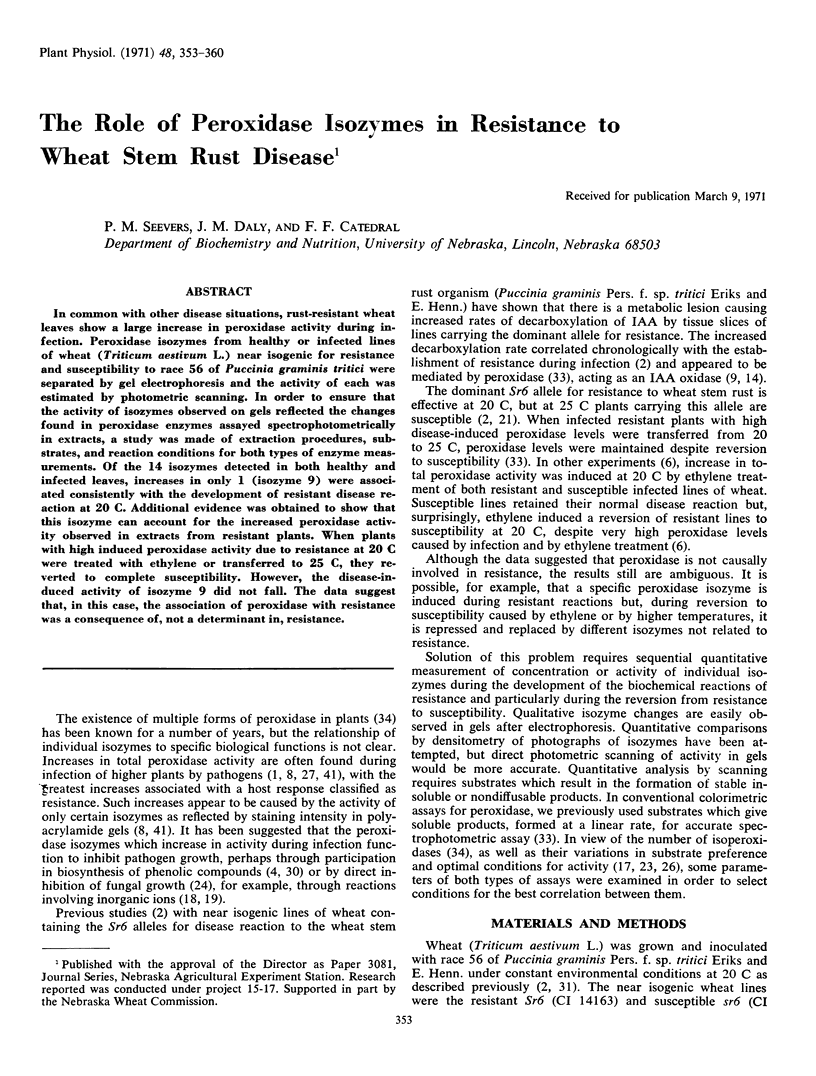
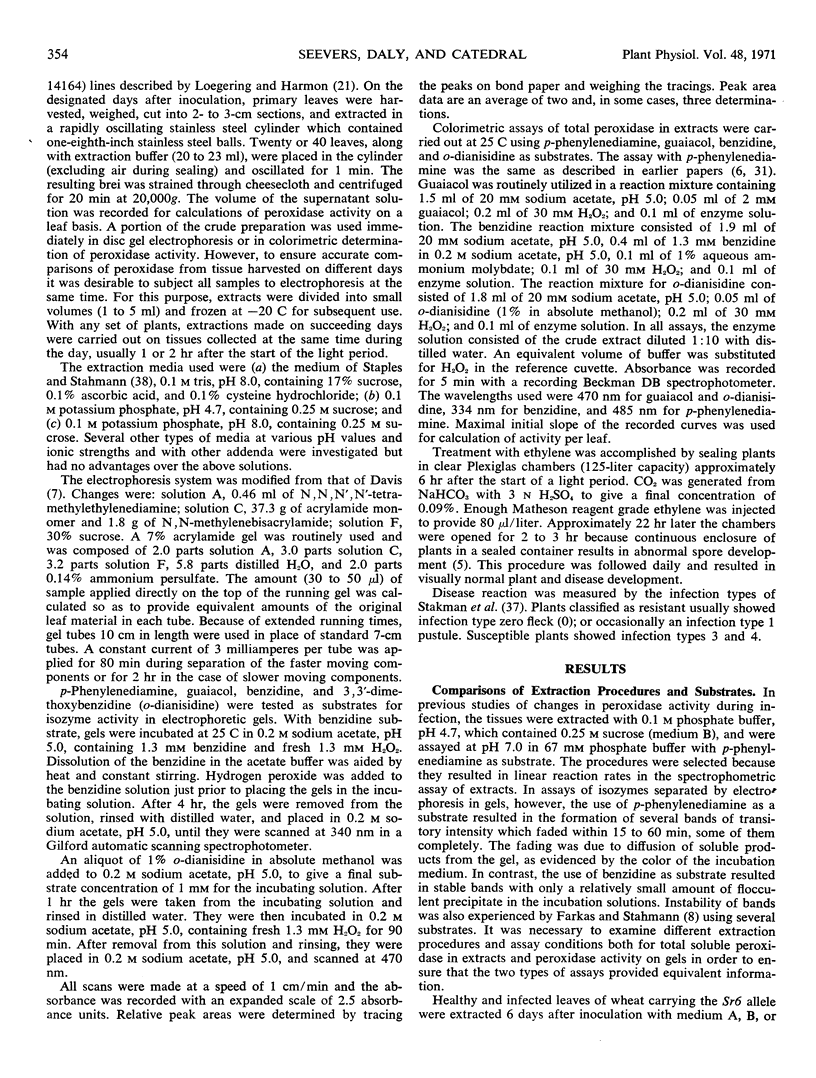
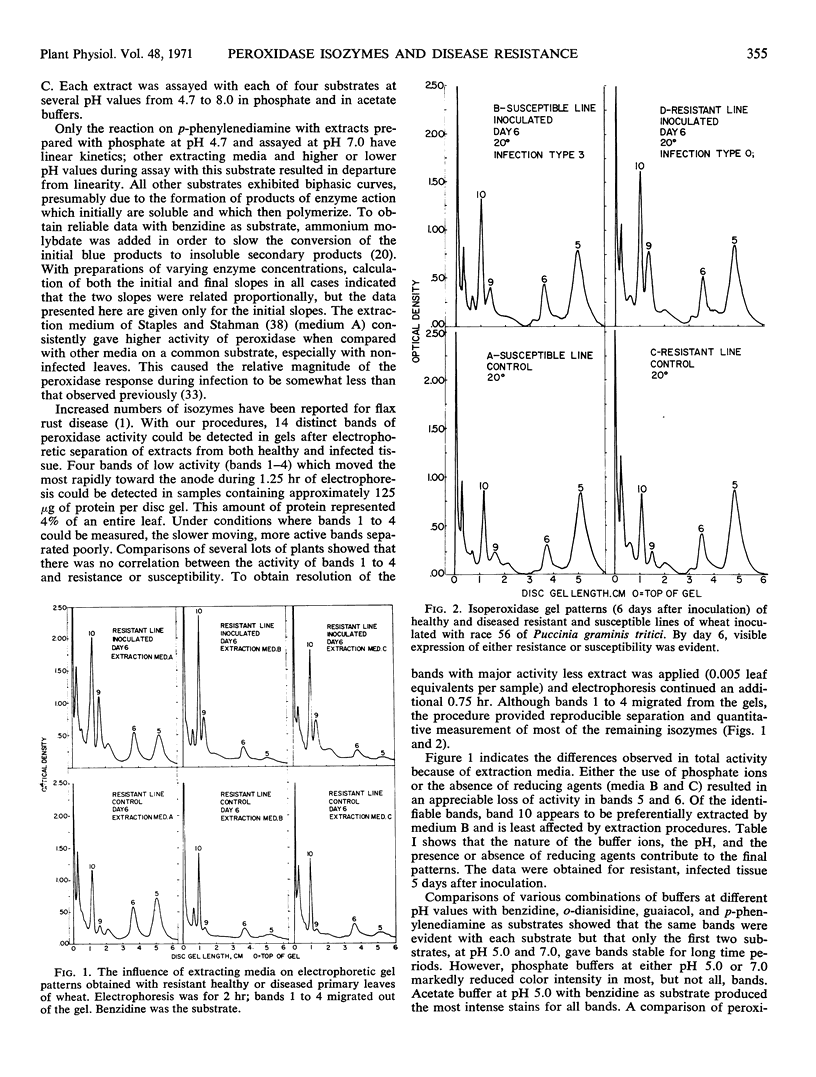
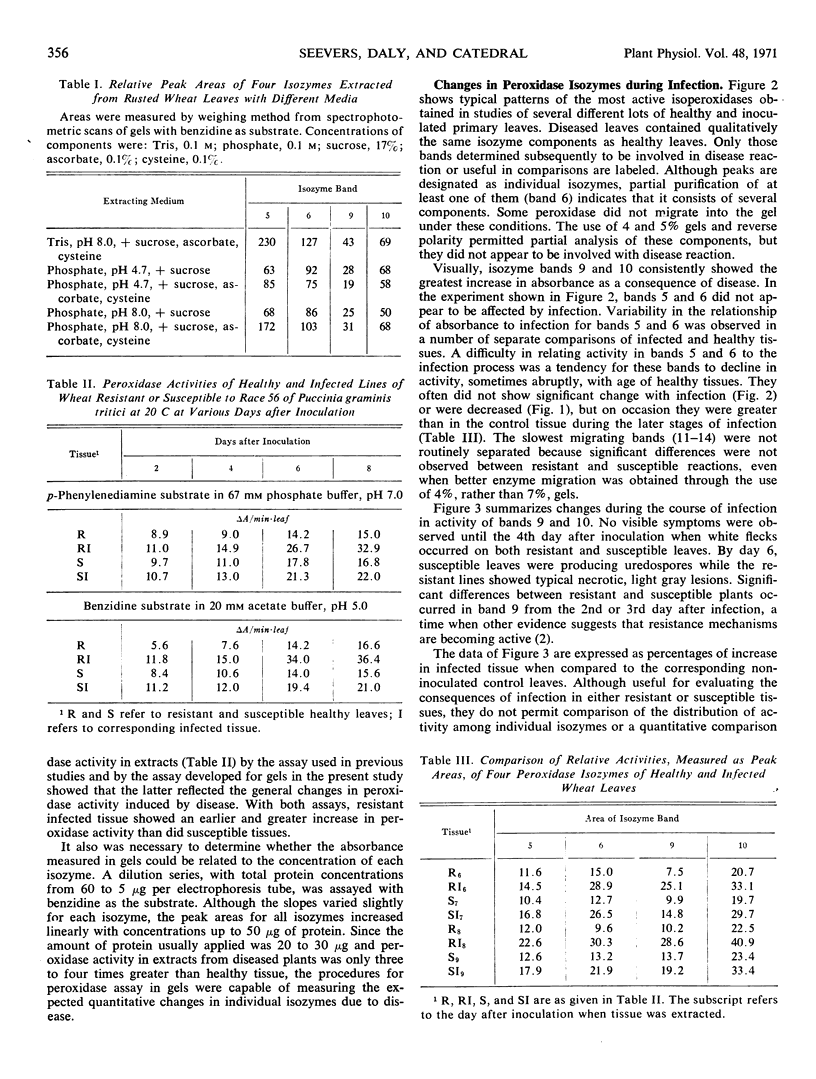
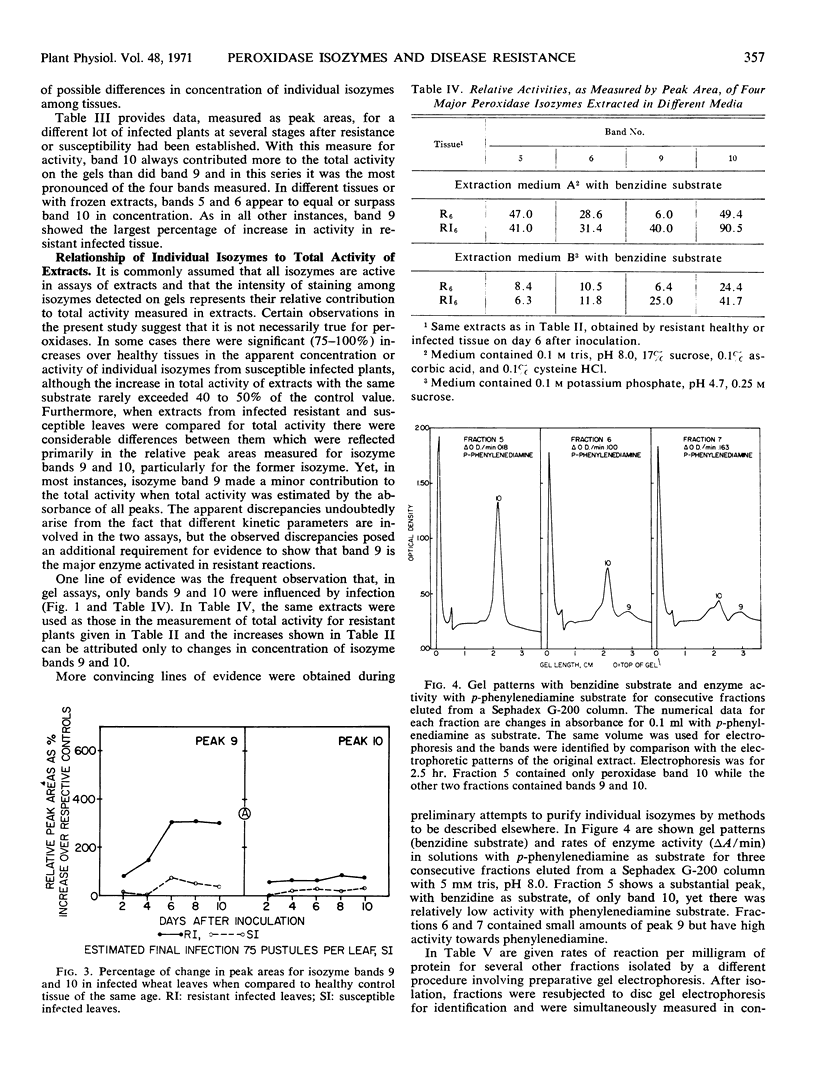
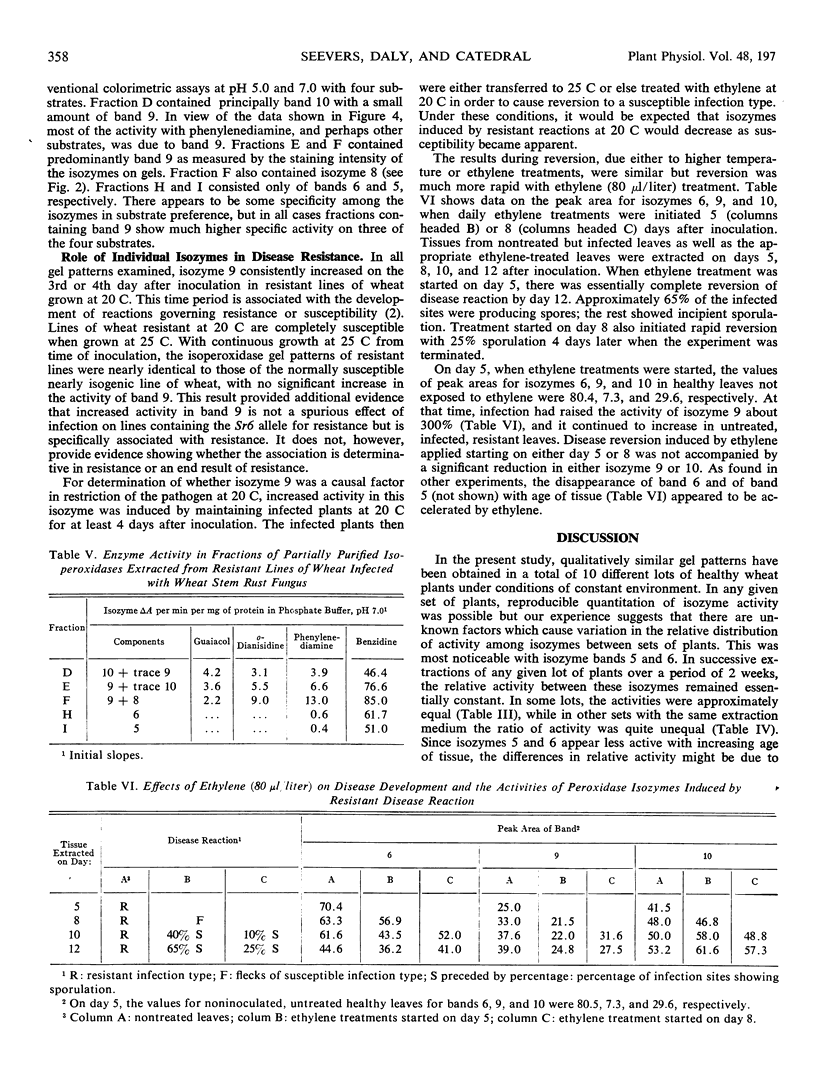
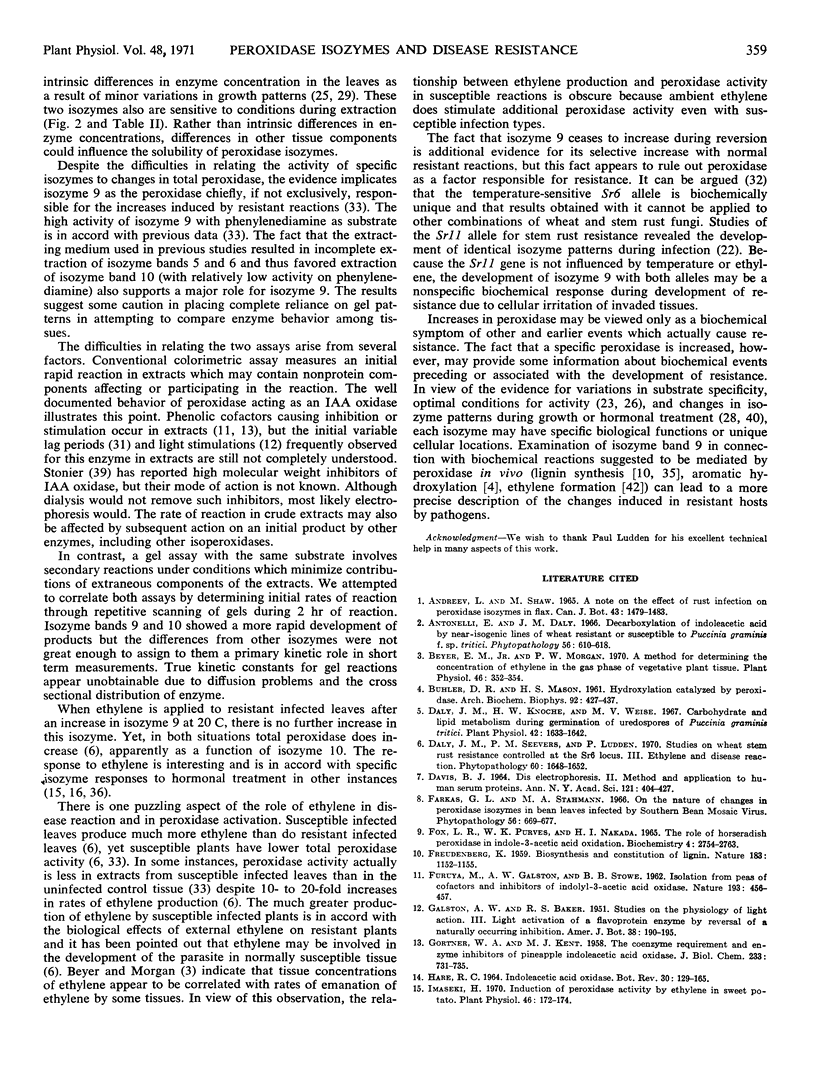
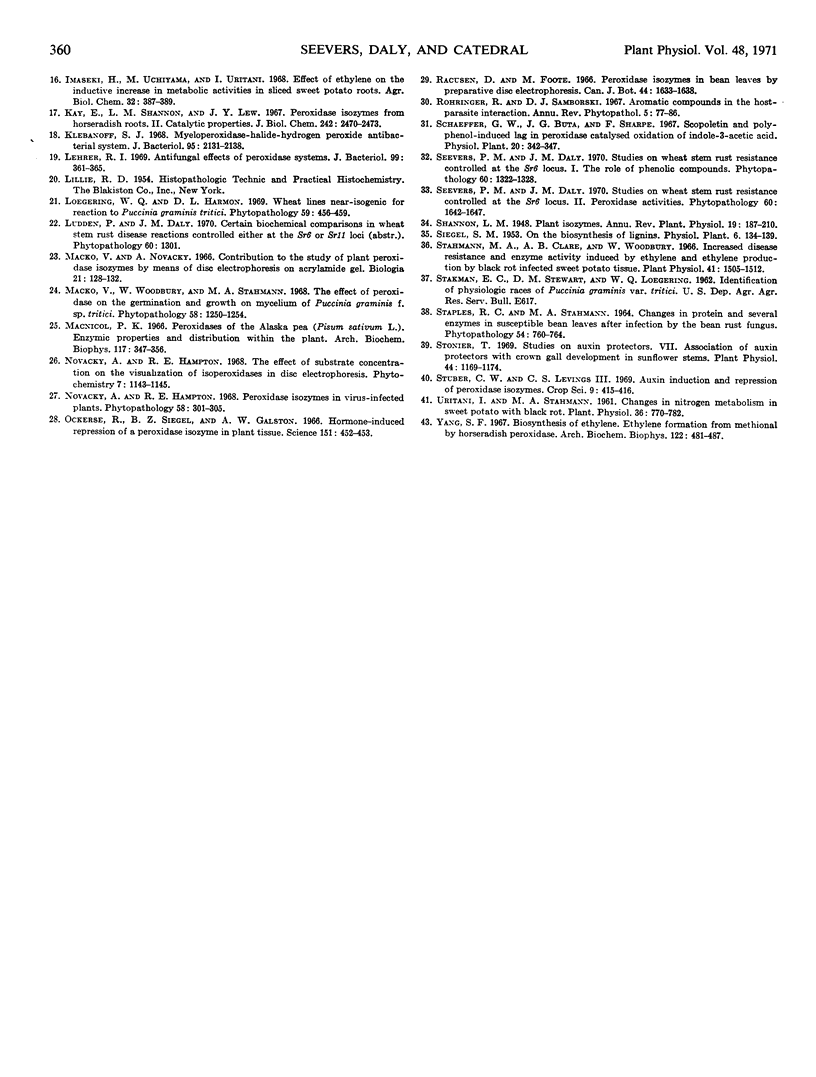
Selected References
These references are in PubMed. This may not be the complete list of references from this article.
- Beyer E. M., Morgan P. W. A method for determining the concentration of ethylene in the gas phase of vegetative plant tissues. Plant Physiol. 1970 Aug;46(2):352–354. doi: 10.1104/pp.46.2.352. [DOI] [PMC free article] [PubMed] [Google Scholar]
- DAVIS B. J. DISC ELECTROPHORESIS. II. METHOD AND APPLICATION TO HUMAN SERUM PROTEINS. Ann N Y Acad Sci. 1964 Dec 28;121:404–427. doi: 10.1111/j.1749-6632.1964.tb14213.x. [DOI] [PubMed] [Google Scholar]
- Daly J. M., Knoche H. W., Wiese M. V. Carbohydrate and Lipid Metabolism During Germination of Uredospores of Puccinia graminis tritici. Plant Physiol. 1967 Nov;42(11):1633–1642. doi: 10.1104/pp.42.11.1633. [DOI] [PMC free article] [PubMed] [Google Scholar]
- FREUDENBERG K. Biosynthesis and constitution of lignin. Nature. 1959 Apr 25;183(4669):1152–1155. doi: 10.1038/1831152a0. [DOI] [PubMed] [Google Scholar]
- FURUYA M., GALSTON A. W., STOWE B. B. Isolation from peas of co-factors and inhibitors of indolyl-3-acetic acid oxidase. Nature. 1962 Feb 3;193:456–457. doi: 10.1038/193456a0. [DOI] [PubMed] [Google Scholar]
- Farkas G. L., Stahmann M. A. On the nature of changes in peroxidase isoenzymes in bean leaves infected by southern bean mosaic virus. Phytopathology. 1966 Jun;56(6):669–677. [PubMed] [Google Scholar]
- Fox L. R., Purves W. K., Nakada H. I. The role of horseradish peroxidase in indole-3-acetic acid oxidation. Biochemistry. 1965 Dec;4(12):2754–2763. doi: 10.1021/bi00888a028. [DOI] [PubMed] [Google Scholar]
- GORTNER W. A., KENT M. J. The coenzyme requirement and enzyme inhibitors of pineapple indoleacetic acid oxidase. J Biol Chem. 1958 Sep;233(3):731–735. [PubMed] [Google Scholar]
- Imaseki H. Induction of peroxidase activity by ethylene in sweet potato. Plant Physiol. 1970 Jul;46(1):172–174. doi: 10.1104/pp.46.1.172. [DOI] [PMC free article] [PubMed] [Google Scholar]
- Kay E., Shannon L. M., Lew J. Y. Peroxidase isozymes from horseradish roots. II. Catalytic properties. J Biol Chem. 1967 May 25;242(10):2470–2473. [PubMed] [Google Scholar]
- Klebanoff S. J. Myeloperoxidase-halide-hydrogen peroxide antibacterial system. J Bacteriol. 1968 Jun;95(6):2131–2138. doi: 10.1128/jb.95.6.2131-2138.1968. [DOI] [PMC free article] [PubMed] [Google Scholar]
- Lehrer R. I. Antifungal effects of peroxidase systems. J Bacteriol. 1969 Aug;99(2):361–365. doi: 10.1128/jb.99.2.361-365.1969. [DOI] [PMC free article] [PubMed] [Google Scholar]
- Macnicol P. K. Peroxidases of the Alaska pea (Pisum sativum L.). Enzymic properties and distribution within the plant. Arch Biochem Biophys. 1966 Nov;117(2):347–356. doi: 10.1016/0003-9861(66)90422-x. [DOI] [PubMed] [Google Scholar]
- Ockerse R., Siegel B. Z., Galston A. W. Hormone-induced repression of a peroxidase isozyme in plant tissue. Science. 1966 Jan 28;151(3709):452–453. doi: 10.1126/science.151.3709.452. [DOI] [PubMed] [Google Scholar]
- Stahmann M. A., Clare B. G., Woodbury W. Increased disease resistance and enzyme activity induced by ethylene and ethylene production of black rot infected sweet potato tissue. Plant Physiol. 1966 Nov;41(9):1505–1512. doi: 10.1104/pp.41.9.1505. [DOI] [PMC free article] [PubMed] [Google Scholar]
- Stonier T. Studies on Auxin Protectors. VII. Association of Auxin Protectors With Crown Gall Development in Sunflower Stems. Plant Physiol. 1969 Aug;44(8):1169–1174. doi: 10.1104/pp.44.8.1169. [DOI] [PMC free article] [PubMed] [Google Scholar]
- Yang S. F. Biosynthesis of ethylene. Ethylene formation from methional by horseradish peroxidase. Arch Biochem Biophys. 1967 Nov;122(2):481–487. doi: 10.1016/0003-9861(67)90222-6. [DOI] [PubMed] [Google Scholar]


